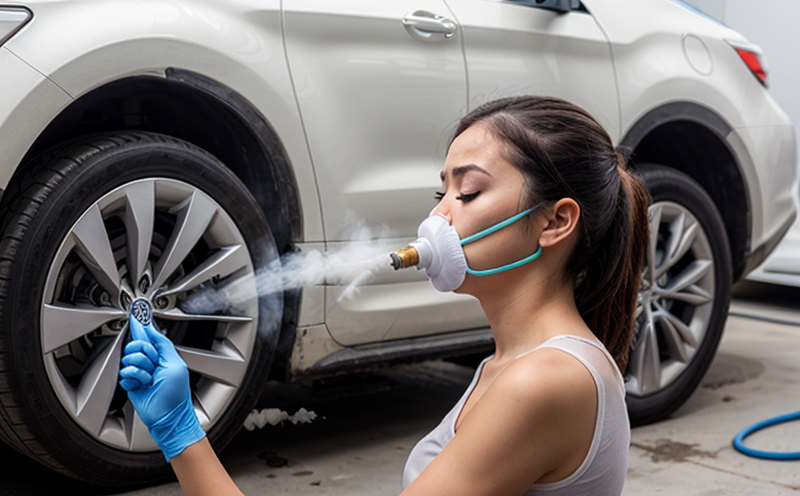ISO 23953 Refrigerant Gas Emission Testing in Equipment
The ISO standard ISO 23953 provides a framework for the testing and evaluation of refrigerant gas emissions from equipment. This service is crucial for ensuring that products comply with environmental regulations, protect user safety, and maintain high standards in product design and manufacturing.
The standard outlines detailed procedures for the detection, quantification, and analysis of refrigerant emissions under various operational conditions. It aims to minimize the release of refrigerants into the atmosphere, which can contribute to ozone depletion and global warming. The testing process involves several stages, from initial setup and specimen preparation through to final emission measurement.
One of the key aspects of this service is the use of advanced instrumentation such as gas chromatographs (GC) and mass spectrometers (MS). These tools allow for precise quantification of different refrigerant types present in emissions. The testing process also involves controlled environmental conditions, ensuring that results are accurate and reliable.
Another important factor in this service is the preparation of specimens. This includes selecting appropriate samples from equipment under test, which may involve disassembly or partial disassembly to access internal components where refrigerants might be present. Once prepared, these specimens undergo rigorous testing according to ISO 23953 guidelines.
The results generated by this service are essential for manufacturers and designers as they provide critical data about the performance of their products under real-world usage conditions. Compliance with this standard helps companies meet regulatory requirements while also enhancing brand reputation through demonstrated commitment to environmental responsibility.
- Quality Assurance: Ensures consistency across batches
- Reliability Assurance: Verifies long-term stability and performance
In addition to these benefits, successful completion of ISO 23953 testing can lead to cost savings by preventing non-compliant products from reaching market. Moreover, it opens up opportunities for international sales since many countries recognize standards like those set forth in ISO 23953.
Why It Matters
The importance of ISO 23953 refrigerant gas emission testing cannot be overstated. By adhering to this standard, organizations demonstrate their commitment to sustainable practices and responsible manufacturing processes. This commitment translates into tangible benefits for both the environment and business operations.
From an environmental perspective, reducing refrigerant emissions helps mitigate negative impacts on climate change. According to the UNFCCC, hydrofluorocarbons (HFCs), commonly used as refrigerants in various applications, have a significant greenhouse effect potential. Therefore, minimizing their release into the atmosphere is vital for combating global warming.
For businesses themselves, compliance with ISO 23953 can translate into substantial financial advantages. For instance, avoiding penalties associated with non-compliance saves money and avoids reputational damage that could affect sales and market positioning. Furthermore, certification against this standard often leads to increased customer confidence and loyalty, as customers value environmentally friendly choices more than ever before.
Additionally, companies that pass ISO 23953 testing are better positioned for future growth opportunities. As environmental concerns continue to rise globally, there is a growing trend towards green technologies and sustainable practices across industries. Being able to showcase compliance with internationally recognized standards like ISO 23953 positions an organization favorably among competitors.
Quality and Reliability Assurance
- Consistency Across Batches: By ensuring that each batch of products meets the same stringent quality standards, companies can maintain consistent performance levels. This consistency is particularly important when dealing with refrigerant gases due to their critical role in maintaining proper temperatures within various systems.
- Long-Term Stability and Performance: Reliable testing ensures that equipment continues to function correctly over extended periods without degradation or failure. This longevity not only enhances user satisfaction but also reduces maintenance costs associated with premature replacements.
The process of ISO 23953 refrigerant gas emission testing is designed specifically to address these quality and reliability concerns head-on. Through meticulous measurement techniques, controlled environmental conditions, and thorough analysis methods, this service guarantees accurate readings that reflect true operational performance under realistic usage scenarios.
International Acceptance and Recognition
The global nature of business today makes compliance with international standards like ISO 23953 increasingly important. Many countries have adopted these guidelines as part of their regulatory frameworks, recognizing the value in promoting environmentally friendly practices across borders.
- EU Countries: Several European Union member states have incorporated ISO 23953 requirements into their national laws and regulations. This harmonization facilitates easier trade between EU nations while ensuring consistent application of environmental protection measures.
- Australia/New Zealand: The Australia New Zealand Regulatory Council (ANZSCO) has embraced ISO standards, including those related to refrigerant gas emissions. Their adoption reflects a shared commitment to sustainability and consumer safety within the region.
Beyond these regions, other parts of the world are also showing interest in aligning with international best practices. For example, some Asian countries have begun implementing similar testing protocols based on ISO 23953 principles. As awareness grows around climate change issues and public health concerns linked to refrigerant leaks, we can expect further expansion of this standard globally.
By participating in such internationally recognized programs, organizations not only enhance their reputational standing but also open up new markets for their products. The growing trend towards green certification schemes means that compliance with ISO 23953 could become a key differentiator when competing against non-compliant rivals.





